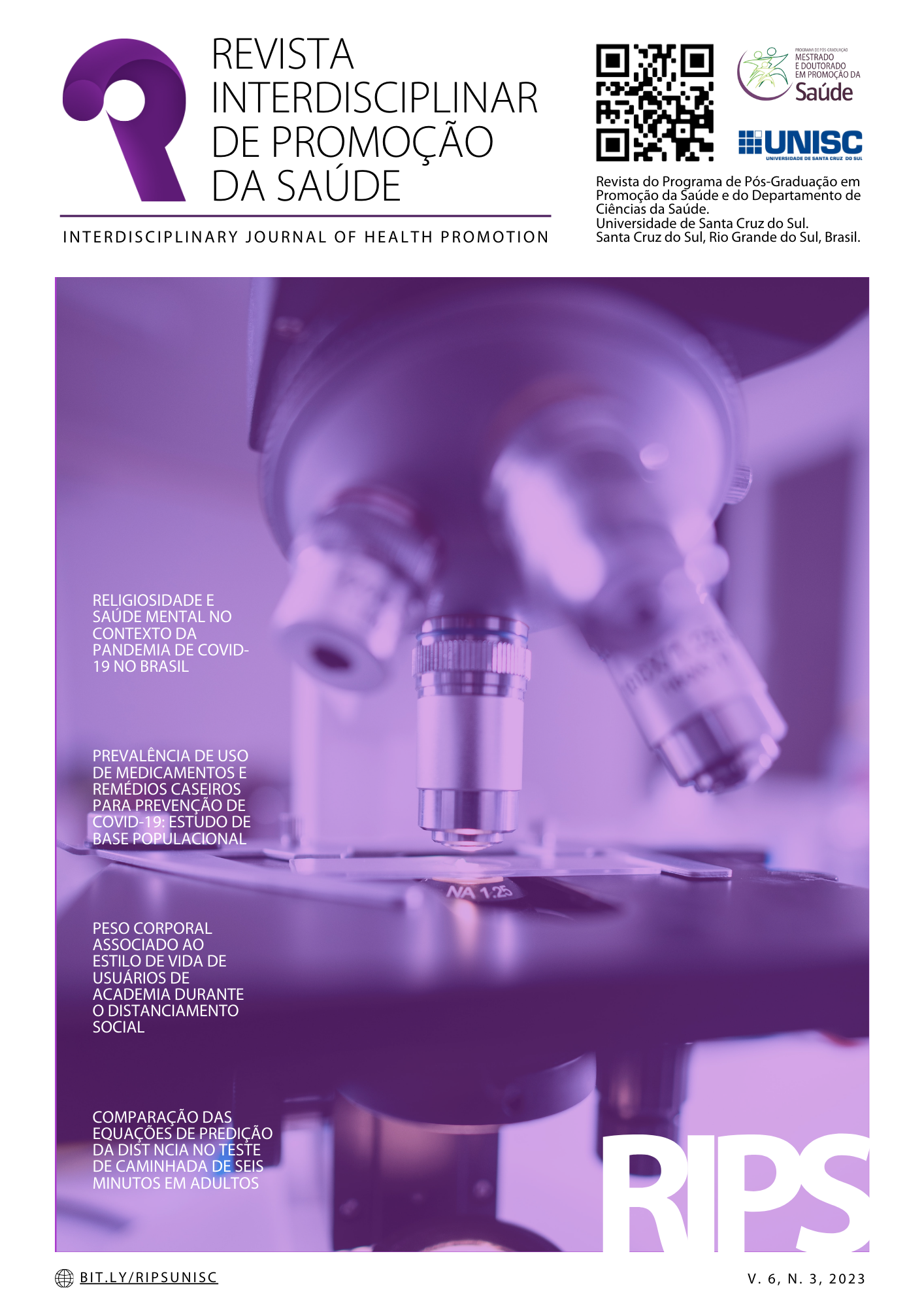Religiosity and mental health in the context of the Covid-19 pandemic in Brazil
DOI:
https://doi.org/10.17058/rips.v6i3.17989Keywords:
Covid-19, Mental Health, Religion and MedicineAbstract
Introduction: the Covid-19 pandemic impacted the lives of many people and its clinical and social effects are still being perceived. In addition to the disease, economic, political and cultural factors were transformed, especially as a result of spatial control practices performed during the most critical moments of the health emergency. In this context, religiosity emerged as a dynamic capable of influencing mental health indices. According to studies, in several countries there have been religious manifestations associated with health care, with the aim of promoting support for their adherents. Objective: to relate socioeconomic data to religiosity and quality of life scores, fear of Covid-19 and depressive symptoms during the Covid-19 pandemic in Brazil. Method: cross-sectional study, carried out through an online questionnaire, aiming to form a “snowball” sampling in Brazilian territory. Socioeconomic profile questionnaires, fear scale of Covid-19, religiosity and quality of life were applied. Data analysis was quantitative and qualitative, analyzing absolute and percentage data in thematic analysis modality, from the intersection of the results of each questionnaire and theoretical support. Results: 226 valid responses were obtained, from 11 Brazilian states, mostly from -declared white women, under 50 years of age, with family income above R$ 5,000.00 per month, with aself high prevalence of religiosity. There were low scores on the fear scale and a high prevalence of depressive symptoms. Conclusion: The present work demonstrated high adherence to religiosity and a strong correlation between religiosity and quality of life, but a low relationship between the exercise of beliefs and mental health in the face of waves of Covid-19. Still, high scores were detected referring to depressive-anxious symptoms, which suggests that, among the researched subjects, religiosity did not interfere significantly in the context of mental health.
Downloads
References
Organização Mundial de Saúde. WHO Coronavirus - COVID-19 Dashboard. [documento na Internet]. [atualizado em 19 de novembro de 2022; citado em 19 de novembro de 2022]. Disponível em: https://Covid19.who.int.
The World Bank. O COVID-19 lança a economia mundial na pior recessão desde a Segunda Guerra Mundial, 2023. [documento na Internet]. [atualizado em 08 de junho de 2020; citado em 19 de novembro de 2022]. Disponível em: https://www.worldbank.org/pt/news/press-release/2020/06/08/Covid-19-to-plunge-global-economy-into-worst-recession-since-world-war-ii.
Darsie C, Weber DL. Disease and space control: issues about dispersion and isolation in pandemic times. J Infect Control 2020; 9(2):47-48. https://jic-abih.com.br/index.php/jic/article/view/298/pdf_1.
Hsiang S, Allen D, Annan-Phan S, Bell K. The effect of large-scale anti-contagion policies on the COVID-19 pandemic. Nature 2020; 584:262–267. doi: http://dx.doi.org/10.1038/s41586-020-2404-8.
Altmann DM, Boyton RJ. COVID-19 vaccination: The road ahead. Science 2022; 375(6585):1127-1132. doi: http://dx.doi.org/10.1126/science.abn175.
Pinto EB. Espiritualidade e Religiosidade: Articulações. REVER 2009; 9:68-83. https://www.pucsp.br/rever/rv4_2009/t_brito.pdf.
Pereira JBB. Religiosidade no Brasil. São Paulo: Edusp. 2013.
Perciaccante A, Coralli A, Charlier P. Which Saint to pray for fighting against a Covid infection? A short survey. Ethics Med Public Health 2021; 18:100674. doi: http://dx.doi.org/10.1016/j.jemep.2021.100674.
Milvia MM. Vatican News. San Marcelo al Corso, a igreja do Crucifixo milagroso. 2023. [documento na Internet]. [atualizado em 29 de março de 2021; citado em 19 de novembro de 2022]. Disponível em: https://www.vaticannews.va/pt/igreja/news/2021-03/igreja-sao-marcelo-roma-crucifixo-milagroso.html
Kapoor V, Belk R, Goulding C. Ritual Revision During a Crisis: The Case of Indian Religious Rituals During the COVID-19 Pandemic. J Public Policy Mark 2022; 41(3):277–297. doi: http://dx.doi.org/10.1177/07439156221081485.
Akmaliah W, Burhani AN. Digital Islam in Indonesia: The Shift of Ritual and Religiosity during Covid-19. ISEAS-Yusof Ishak Institute, 2021. [documento na Internet]. [atualizado em 12 de agosto de 2021; citado em 19 de novembro de 2022]. Disponível em https://www.iseas.edu.sg/articles-commentaries/iseas-perspective/2021-107-digital-islam-in-indonesia-the-shift-of-ritual-and-religiosity-during-covid-19-by-wahyudi-akmaliah-and-ahmad-najib-burhani.
Alcorão Sagrado. Trad. El Hayek, Samir. São Paulo: Marsam Editora Jornalística. 1994.
Vinuto J. A amostragem em bola de neve na pesquisa qualitativa: um debate em aberto. Tematicas 2014; 22(44):203–220. doi: http://dx.doi.org/10.20396/tematicas.v22i44.10977.
Fleck MPA, Skevington S. Explicando o significado do WHOQOL-SRPB. Rev Psiquiatr Clin 2007; 34(Suppl 1):146-9. doi: http://dx.doi.org/10.1590/S0101-60832007000700018.
Kroenke K, Spitzer RL, Williams JB. The PHQ-9: validity of a brief depression severity measure. J Gen Intern Med 2001; 16(9):606–613. doi: http://dx.doi.org/10.1046/j.1525-1497.2001.016009606.x.
Faro A, Silva LS, Nunes DS, Feitosa ALB. Adaptação e validação da Escala de Medo da COVID-19. Estud. psicol 2022; 39:e200121. doi: http://dx.doi.org/10.1590/1982-0275202239e200121.
Souza LK. Pesquisa com análise qualitativa de dados: conhecendo a Análise Temática. Arq Bras Psicologia 2019; 71(2):51-67. doi: http://dx.doi.org/10.36482/1809-5267.ARBP2019v71i2p.51-67.
Gonçalves VLM, Leite MMJ. Instrumento para mensuração de atitudes frente ao processo de avaliação de desempenho. REBEN 2005; 58(5):563–7. doi: http://dx.doi.org/10.1590/S0034-71672005000500012.
Heckathorn DD. Comment: Snowball versus respondent-driven sampling. Sociol Methodol 2011; 41(1):355-366. doi: http://dx.doi.org/10.1111/j.1467-9531.2011.01244.x.
Bartz, A. Trânsito religioso no Brasil: mudanças e tendências contemporâneas. In: Congresso Internacional da Faculdades EST. 2012. p. 258-273. São Leopoldo, RS, Brasil.
Parohan M. Risk factors for mortality in patients with Coronavirus disease 2019 (COVID-19) infection: a systematic review and meta-analysis of observational studies. The Aging Male 2020; 23(5):1416-1424. doi: http://dx.doi.org/10.1080/13685538.2020.1774748.
Angerami-Camon, VA. Espiritualidade e prática clínica. São Paulo: Thomson. 2004.
Pinto AN; Falcão EBM. Religiosidade no contexto médico: entre a receptividade e o silêncio. RBEM 2014; 38(1):38-46. doi: http://dx.doi.org/10.1590/S0100-55022014000100006.
Murakami R, Campos CJG. Religião e saúde mental: desafio de integrar a religiosidade ao cuidado com o paciente. REBEN 2012; 65(2):361-367. http://pepsic.bvsalud.org/scielo.php?script=sci_arttext&pid=S1808-42812015000200002
Braam AW, Beekman AT, Deeg DJ, Smit JH, Van TW. Religiosity as a protective or prognostic factor of depression in later life; results from a community survey in The Netherlands. Acta Psychiatr Scand 1997; 96(3):199-205. doi: http://dx.doi.org/10.1111/j.1600-0447.1997.tb10152.x
Gurvich C. Coping styles and mental health in response to societal changes during the COVID-19 pandemic. Int J Soc Psychiatry 2021; 67(5):540-549. doi: http://dx.doi.org/10.1177/0020764020961790.
Downloads
Published
How to Cite
Issue
Section
License
A submissão de originais para este periódico implica na transferência, pelos autores, dos direitos de publicação impressa e digital. Os direitos autorais para os artigos publicados são do autor, com direitos do periódico sobre a primeira publicação. Os autores somente poderão utilizar os mesmos resultados em outras publicações indicando claramente este periódico como o meio da publicação original. Em virtude de sermos um periódico de acesso aberto, permite-se o uso gratuito dos artigos em aplicações educacionais e científicas desde que citada a fonte conforme a licença CC-BY da Creative Commons.




